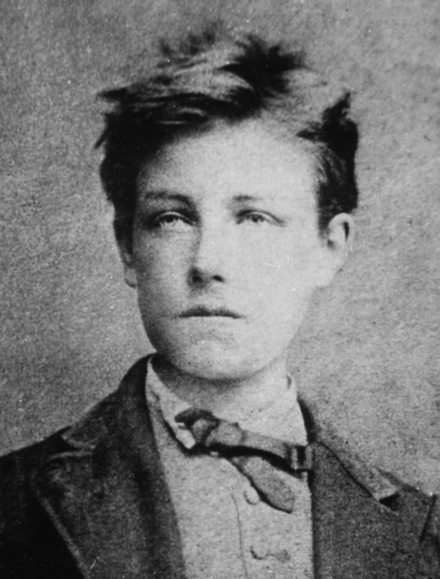Vox Populi
A curated webspace for Poetry, Politics, and Nature with over 6,000,000 visitors since 2014 and over 9,000 archived posts.
Justin Vicari: Encounters with Rimbaud
Golden Age One of those always angelic voices — it echoes in both ears, — cuts through my haze: this rhizome of a thousand questions leads nowhere but drinking, madness; embrace this tower, so pleasant, so simple: it’s only wave, flora, and it’s your family! Then she starts singing. O! so pleasant, so simple, visible to the naked eye … — I sing with her, — embrace this tower, so pleasant, so simple: it’s only wave, flora, and it’s your family! … etcetera … Then, one voice — it isn’t angelic? — echoes around me, putting matters clear; and suddenly sings, my breathsister: with German tone yet passionate, round: the world is vicious if this even shocks us. See the unexplained disaster let it burn O pretty chateau how bright your life From what Era are you, princely character of our wondrous brother? etcetera … I too am singing: multiple sisters. Voices never before made public surround me in chaste glory … etcetera … -- Women Picking Lice The instant the child’s crown, crawling with red agonies, starts to beg the hazy white dream swarm, two tall, charming sisters appear by his bed with skinny fingers with argentine nails. They sit the child at a cross-barred window wide where the blue air bathes a mess of flowers and through his thick hair where the dew drips their slim, scary, pretty fingers stroll. He hears the singsong of their bated breaths bloom to long pink-honey tendrils when it does not crack in a hiss, spit sucked back from their lips or thirst for kissing. He hears their black lashes bat beneath fragrant hushes; while their sweet electric fingers make each tiny lice death crackle under their regal nails, in his gray-outs. Then wine of Lethargy floods his guts, harmonica sigh that could bring on madness; like slow caresses, the child feels incessant urges to weep well up in him and die. -- Eternity It’s found again. What? — Eternity. It’s the sea wrestling the sun. Watchman soul, let’s murmur the vow of nowhere night and day on fire. My eternal soul, keep your vow despite lonely night and day on fire. Democracies, communisms, you lose your self in them and must get away. — Never hope, no orietur. Wait long enough, all tortures are assured. Only you embers of satin breathe the faith without which we would say: basta. No more tomorrows, embers of satin, your burning is our duty’s sole devotion. It’s found again. What? — Eternity. It’s the sea making love to the sun. -- Crows Lord, when the prairie’s cold, when long angeluses die in beaten villages … over that denuded nature, dear delectable crows throb the gigantic sky. Shrieking army from another planet, frigid winds attack your nests. You, the length of jaundiced rivers, on roads to ancient Calvaries spanning ditches, pits, disperse and come together by the thousands above fields of France where the last war’s dead now sleep, you wove and weave eternal circles in the winter sky making wanderers brood. Be the crier of our conscience then, O our black funereal bird. But you: sky’s saints, high in an oak, spellbound evening’s crooked mast, leave May’s warblers to those deep forest hermits who keep infinities of defeat in chains down in the grass that eats
Author’s note: I am not calling these translations, rather I am calling them ‘encounters with Rimbaud.’ The method is to give the poems a unified and (as much as possible) modern voice. I am trying to capture a tone, ribald, sardonic, rebellious, shocking, which Rimbaud exemplified, but which is kind of sanitized from a lot of English versions. Among other things, the role of humor and irony in his work has been overlooked; in fact the original French has a lot of humor in it, especially parts of Season in Hell. At any rate it comes from my considered reading of Rimbaud, whose work I have been reading in French and trying to translate since I was about 12. I feel I am uncovering the real tonal meaning of the poems by taking slight liberties; I would say these do have a lot of literal-ness, I depart just enough to make me wary of calling them translations. And I remove punctuation at times to make it flow and to de-territorialize the syntax.
Copyright 2020 Justin Vicari
Jean Nicolas Arthur Rimbaud (1854 – 1891) was a French poet known for his influence on modern literature and arts. Born in Charleville-Mézières, he started writing at a very young age and excelled as a student, but abandoned his formal education in his teenage years to run away from home to Paris amidst the Franco-Prussian War. During his late adolescence and early adulthood he began the bulk of his literary output, then completely stopped writing at the age of 21, after assembling one of his major works, Illuminations. Rimbaud was known to have been a libertine and a restless soul, having engaged in an at-times-violent romantic relationship with fellow poet Paul Verlaine, which lasted nearly two years. After ending his literary career, he traveled extensively on three continents as a merchant before his death from cancer just after his thirty-seventh birthday.

Discover more from Vox Populi
Subscribe to get the latest posts sent to your email.

Beautiful work. Thank you, Justin, for these “encounters.”
jb
LikeLiked by 1 person
Reblogged this on Site Title and commented:
Very inspiring encounter with Rimbaud.
LikeLiked by 1 person